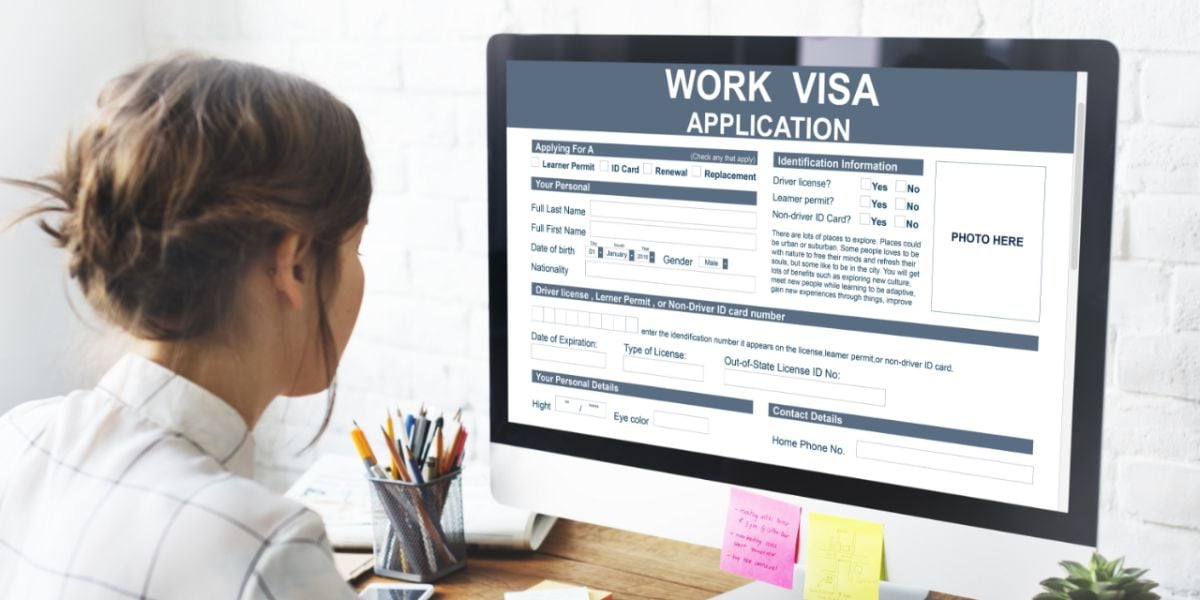
Are you planning to move to Belgium and start a new professional adventure? Great idea! Just know that, depending on your nationality, a work permit might be necessary. If you come from the European Union (EU), the European Economic Area (EEA), or Switzerland, good news: no permit is required, thanks to the freedom of movement principle. You can settle, look for a job, and start without any particular formalities.

The different types of work permits available in Belgium
In Belgium, there are three types of work permits:
- Work Permit "A" : valid indefinitely, allowing you to work for any employer.
- Work Permit "B" : valid for one year, tied to a single employer.
- Work Permit "C" : intended for temporary stays, also valid for one year (renewable).
Regardless of which permit applies to you, you will need to apply if you wish to work in Belgium.
Conditions for obtaining a work permit in Belgium
There are certain requirements to obtain these specific work permits. We invite you to review each of these work permits to decide which one you will need to legally work in Belgium.
Work Permit "A"
Even though you can apply for a Type "A" work permit for an unlimited duration, be aware that it is only granted to employees who can prove they have worked in Belgium for four years under a Type "B" work permit.
Additionally, you will also need to prove that you have resided in Belgium for 10 uninterrupted years. Essentially, you will need to have worked in the country with a Type "B" work permit before you can consider applying for a Type "A" work permit.
Note that there is an exception to this four-year rule. If you come from one of the following countries, you will only need three years to obtain a Type "A" work permit:
- Algeria;
- Bosnia and Herzegovina;
- Kosovo;
- Macedonia;
- Montenegro;
- Morocco;
- Serbia;
- Tunisia;
- Turkey.
Even better! Regardless of the category you fall into, you can reduce the waiting period by one year if you have other people living with you in Belgium. For example, if you have a spouse, a registered partner, or dependent children, you may be eligible for a Type "A" work permit after just two or three years.
Note:
Not everyone can apply for a Type "A" work permit. It is restricted to the following professions and positions:
- Au pairs;
- Highly qualified workers;
- Researchers and guest professors;
- Specialized technicians;
- Interns.
If a family member holds a Type "B" work permit, or if they are self-employed, or if they do not need a work permit to be employed in Belgium, you will not be eligible to apply for a Type "A" work permit either.
Work Permit "B"
This "B" permit is only issued if the employer is authorized to hire a foreign worker for a vacant position. They generally must prove that they have been unable to find a suitable Belgian candidate through a job market advertisement. An exception is made if you fill a position in shortage.
If your employer sponsors you to come work for them:
Your employer must offer you a salary higher than the set salaries for highly qualified employees and executives in Belgium. This salary can be calculated by considering the gross salary, end-of-year bonuses (taxable), and other allowances and benefits (also taxable).
Moreover, you must be outside Belgium at the time of the "B" work permit application. You cannot simply move to Belgium, look for a job, and then apply for a "B" work permit. This permit is entirely intended to bring external talent to Belgium, not to hire existing job seekers in the country. Therefore, if the Belgian government discovers that you are already in the country while applying for this work permit, your application will be denied.
Work Permit "C"
This permit is issued to foreign nationals legally residing in Belgium for a limited period or in precarious situations. Most of the time, the "C" work permit is reserved for individuals such as students, interns, asylum seekers, and migrant agricultural domestic workers, among others. If you are the spouse/registered partner or child of someone already employed in Belgium, you may need to apply for a "C" work permit.
How to apply for a work permit in Belgium
In general, the employment services of the regional administrations of Wallonia, Brussels-Capital, Flanders, and the German-speaking Community handle the work authorization applications. Application forms can be collected on-site or directly from the administration's website relevant to the applicant.
Other conditions may apply in certain special cases, such as for individuals with a precarious residence right in Belgium or for nationals of countries that have concluded international agreements with Belgium. Remember to inquire with the regional administration you depend on when applying for your work authorization.
For a "A" Work Permit
To apply for a "A" work permit, it will be essential to complete the dedicated form. This application form is available online or from the competent administration. The application must be accompanied by the following documents:
- Information sheet countersigned by the mayor of your place of residence;
- A copy (front and back) of your residence permit;
- A copy of the individual account justifying the mentioned years of work (three or four, depending on your nationality; it can be two or three if you meet the conditions);
- Copies of all work permits obtained before applying for the "A" work permit;
- Copies of your previous payslips.
You must apply for your "A" work permit at the immigration office of your locality. Your municipality will inform you once your work permit has been approved so that you can collect it.
Otherwise, if your application is rejected, you will be notified by mail. Do not be discouraged, as you can always appeal by applying again. However, be sure to do so within a month via a registered letter.
Work Permit "B"
For a "B" work permit, it will be up to the employer to apply on behalf of the future employee. The form must include the following attachments:
- A copy of the letter from the Foreigners Office, stating that a "B" work permit application must be submitted to regularize the employee's work situation;
- A copy of the employment contract (original), dated and signed by both parties (employer and employee);
- A medical certificate dated less than three months ago;
- A copy of the employer's identity card.
Once you learn that your work permit application has been approved, you can contact the Belgian embassy in your country. From there, you will need to apply for a residence visa.
Note that if you change employers, you will need to apply for both a new work permit and a residence visa.
At the end of the year, your employer will need to submit a new "B" work permit application. In fact, they must do so one month before the current permit expires to ensure that you always have a valid work permit. If the application is rejected for any reason, you can appeal within a month.
Work Permit "C"
If you need a "C" work permit, it will again be up to your employer to apply. The application must include the following documents:
- Information sheet countersigned by the mayor of your place of residence;
- A copy (front and back) of your current residence permit.
As we mentioned earlier, this work permit is reserved for temporary residents and is valid for only one year. However, certain circumstances may require you to renew your work permit.
In this case, your employer must be able to do it for you. As with other work permits, they must submit the application at least one month before the current permit expires, and if you receive a refusal, you can always appeal, provided it is done within a month of the rejection date.
''
Professional cards
It is increasingly common for expatriates to be self-employed workers. If you are one, you may be wondering which work permit is the best option for you.
In fact, you will not need to apply for any of the permits mentioned above. Instead, you will need to apply for a professional card (beroepskaart in Dutch). These cards are valid for five years, but you will need to prove that your work will be financially beneficial for Belgium.
To obtain a Professional card, you will need to submit the following documents:
- Your passport;
- A medical certificate;
- 2 passport photos;
- Your business plan (maximum 20 pages);
- Your qualifications;
- Your right of residence (if you do not already have it, you can apply for it concurrently with the Professional Card).
Depending on your situation, you can make this application:
- From abroad: via the Belgian embassy or consulate in your country;
- From Belgium: at an accredited business counter.
Once your professional card is validated, you will still need to complete some administrative steps:
- Obtain a business number from the Crossroads Bank for Enterprises;
- Register for VAT;
- Join a social insurance fund for self-employed workers.
If you work as an agent for a company, you will need to follow the steps in the next paragraph. However, if you are an associate or manager, you will only need to register with a social insurance fund.
Once the five years have passed, you will be able to renew easily, as long as you have met all your financial obligations, such as Belgian taxes. Be sure to apply at least three months before the expiration date to avoid having an expired professional card.
The European Blue card
Are you highly qualified, a graduate, or very experienced, and do you wish to work in Belgium from a non-EU/EEA/Swiss country? The European Blue card might be your best option. It combines both a residence permit and a work permit.
To apply, you must meet several conditions:
- Hold a university degree (master's or equivalent), or justify at least 5 years of professional experience in your field;
- Have a work contract of at least one year for a highly qualified job in Belgium;
- Earn an annual salary above the minimum threshold.
Who does not need the European Blue card?
You do not need to apply for this card if you are already a citizen of the European Union, the European Economic Area, Switzerland, or certain countries with specific agreements with the EU. This includes Australia, Canada, Israel, Japan, New Zealand, South Korea, and the United States, as well as several overseas territories.
The Benefits of the European Blue card
Essentially, this card gives you and your family members the freedom of movement within the EU, except for a few countries that have chosen not to participate in this program:
- Denmark;
- Ireland;
- Iceland;
- Liechtenstein;
- Norway;
- Switzerland.
Intra-Company transfers within the EU
Are you already working in an international company and your employer wants to temporarily transfer you to a Belgian branch or another EU country? This is precisely the purpose of the intra-company transfer (ICT) permit provided for by a European directive.
This arrangement is exclusively for highly qualified workers transferred within the same group of companies present in several EU countries. It mainly concerns:
- Managers,
- Specialists,
- Corporate trainees.
The intra-company transfer (ICT) permit combines residence and work for a maximum duration of 1 year (trainees) to 3 years (managers and specialists). It also facilitates mobility to other EU countries during the secondment.
Good to know:
Depending on your personal situation (student, asylum seeker, temporary worker, etc.) or your country of origin, additional documents may sometimes be required to complete your application. Do not hesitate to contact the employment services in your region in Belgium directly: this will help you avoid unnecessary procedures and save time.
We do our best to provide accurate and up to date information. However, if you have noticed any inaccuracies in this article, please let us know in the comments section below.








